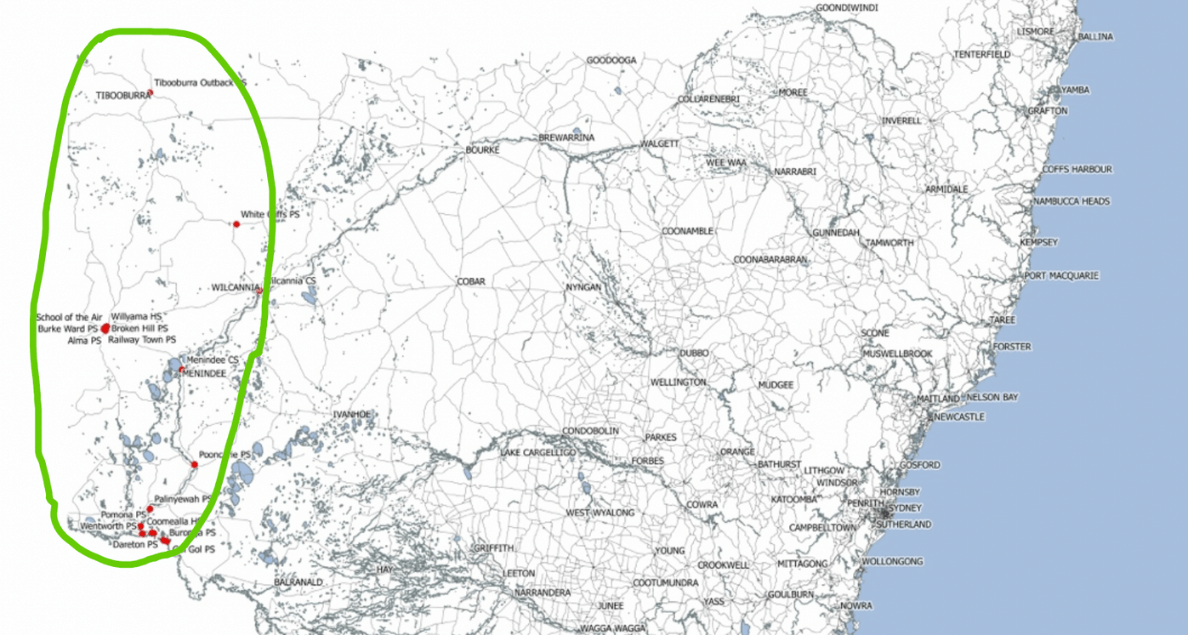Re-centring Outback Education

About
Project Timeline: 2019-2024
Education has been occurring for over 60,000 years on the Australian continent. However, for the last 231 years the interests and approaches of a few densely populated cities on the coastal fringe, and their global connections, have dominated understandings of how education should be delivered. As a result, the nature of education that developed has been ‘spatially blind’ and modelled on practices suited to densely populated locations and the needs of urban communities. The perspectives of rural communities are rarely genuinely considered.
Even rural and regional education policy has taken a generic approach, focussing on the general needs of the diversity of rural and regional schools, ranging from large regional centres, to coastal schools as well as remote schools. Consequently, the unique education needs of outback communities as a specific sub-group of communities has not been properly understood. What if did aside with urban-centric approaches to education and let a cluster of communities and cultures design a new outback education system?
This research program, across a cluster of outback communities in western NSW, aims to ‘recalibrate’ the purpose and delivery of education, both philosophically and practically, by understandings education from a non-metropolitan context. This research will identify and promote the positives and successes of ‘outback’ schooling as understood by communities and teachers. The knowledge and practices uncovered in outback communities in relation to what these communities expect from school education, and how they think education can be best delivered, will better inform the ‘system’ around how to deliver outback schooling. This will enable the development of practices which better align with the needs, interests and conditions of outback communities. It will also improve staffing and leadership by helping school systems better understand communities, and their educational aspirations, on their own terms.
Project Team
Assoc Prof Philip Roberts
Peter Macbeth (NSW DET, Director Educational Leadership Far West Principal Network)
Natalie Downes
Research Strands
Education Success
The identification and application of community-developed indicators of educational ‘success’. This will create a community-developed ‘metric’ that relates to community need and values in order to rethink outback education. This strand also involves focussing on how education is ‘actually’ delivered in the outback from the perspective of practitioners. We aim to identify and celebrate outback innovation.
Education Policy
How would policies pertaining to the running of schools look if they were shaped from an outback perspective? We aim to understand new approaches to policy that serve outback communities.
Staffing and Teaching
This aspect explores how working in an outback school develops a teacher’s professional and personal capacities. This is an approach focussed upon the positives of working in outback schools and can be used to help attract and retain teachers.
Youth
How do youth engage in civic participation in the community and what are their perceptions of education and the future of their communities?
Related Projects
- ARC DECRA: Engaging rural knowledges for sustainable futures: spatial justice and rural schooling
- Cultural context in standardised tests
- The sociocultural experiences of rural students at university
- Access, achievement and the spatial distribution of curriculum in senior secondary schooling
- Workforce motivations and incentives for rural professionals
- Researching the professions
- Rural placements for preservice teachers and health practitioners
- Rural professional practice
- Mapping the fields
- Ruraling educational research
- Valuing the rural: putting the rural first

